-
2018
Previous Year Paper
-
2017
Previous Year Paper
-
2016
Previous Year Paper
-
2015
Previous Year Paper
-
2014
Previous Year Paper
-
2013
Previous Year Paper
-
2012
Previous Year Paper
-
2011
Previous Year Paper
-
2010
Previous Year Paper
-
2009
Previous Year Paper
-
2008
Previous Year Paper
-
2007
Previous Year Paper
-
2006
Previous Year Paper
-
2005
Previous Year Paper
-
2004
Previous Year Paper
-
2003
Previous Year Paper
BCECE Previous Year Questions
The Bihar Combined Entrance Competitive Examination (BCECE) is a very important exam if you plan for undergraduate courses in the state. You can gain admission in engineering, medical, as well as agricultural fields by taking this exam. One of the most effective ways for this exam preparation is by solving BCECE previous year questions at SelfStudys. With these questions, you can get important insights into the exam pattern, question types, difficulty level of the paper, etc. All these aspects make this resource an invaluable part of your study plan.
The subject-matter experts at SelfStudys know how important it is to practice past papers. That’s why, our collection of BCECE previous year question paper is available totally free of cost. We allow you to access authentic exam materials without any cost. So, visit our website today to get your hands on this excellent study resource.
Important Information Related To Bihar Combined Entrance Competitive Examination
In the below table, you can learn about all the key details related to the BCECE exam. With the help of this information, you can understand this exam in a better way.
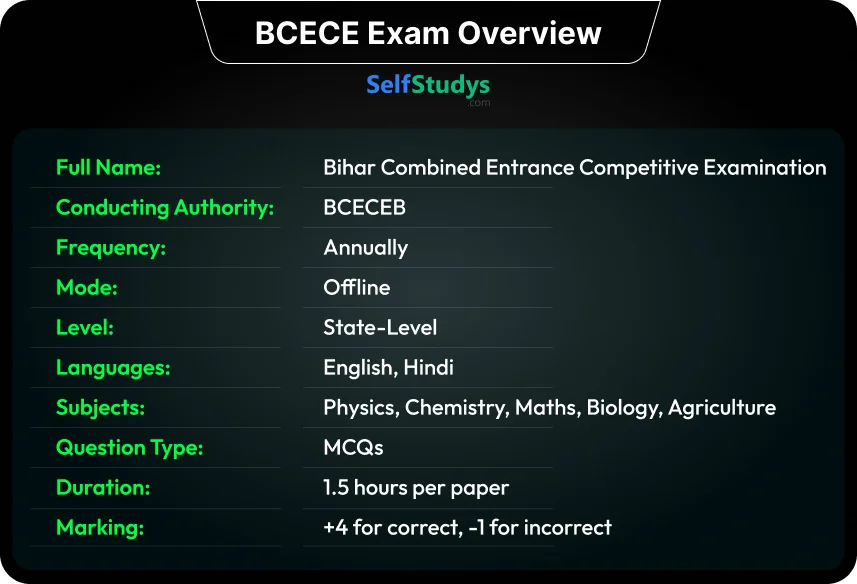
|
ASPECT |
DESCRIPTION |
|
Full Name of the Examination |
BCECE: Bihar Combined Entrance Competitive Examination |
|
Examination Conducting Authority |
BCECEB: Bihar Combined Entrance Competitive Examination Board |
|
Frequency of the Examination |
Once a year |
|
Examination Mode |
Offline |
|
Level of the Examination |
State-Level Undergraduate Exam |
|
Language of the Question Paper |
|
|
Subjects Included in the Examination |
|
|
Types of Questions |
Multiple-Choice Questions |
|
Duration of the Examination |
1 hour and 30 minutes for each paper. |
|
Marking Scheme |
|
|
Official Website |
Year-Wise BCECE Previous Year Question Paper
On the digital platform of SelfStudys, you can explore a variety of BCECE previous year question paper with solution PDF download for the Engineering stream. By accessing these PYPs, you will learn the overall structure of the examination. Also, with their practice, you can improve your time management skills, boost confidence, and know the topics that are tested frequently in the exam. For your benefit, we have mentioned the direct links to these year-wise papers below. You can click on any year for which you want to solve the paper and enhance your problem-solving skills.
We’ve mentioned the download links for BCECE Previous Year Questions year-wise below:
BCECE Previous Year Question Paper With Solution PDF Download
Every BCECE previous year question PDF download on our website includes not just the questions. You will find correct solutions along with detailed explanations of the questions in the PDF file. This excellent feature helps you to grasp all the complex topics easily and notice your weaker areas. Then, you can learn the best methods to approach every type of problem and increase your scoring potential in the upcoming Bihar Combined Entrance Competitive Examination. Moreover, when you analyze the provided solutions, you are able to recognize the shortcuts and techniques that you can apply to similar questions while taking the exam.
Procedure To Get The BCECE Previous Year Question PDF Download From SelfStudys
With the help of the steps that are mentioned below, you can get your hands on the BCECE PYQ PDF download and utilize it for effective exam preparation. You just have to make sure that the internet is working properly on your device.
- Open the web browser that you mostly use and simply type www.selfstudys.com in its given search space.

- Our homepage displays various elements where you will see a ‘Navigation’ bar. You should click on the icon to open the list of main categories.
- Now, in this list, you have to select the ‘JEE’ section as highlighted in the image shown below.
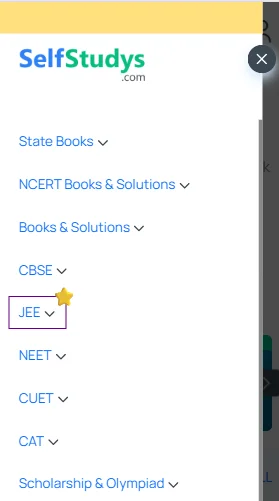
- You can go through the sub-categories of this section and then tap on the ‘BCECE previous year papers’ option.

- A new web page will be loaded on your screen within a few seconds. Here, you can check out all the year-wise previous year question paper of BCECE.

- You have the option to choose any paper to solve the BCECE previous year questions from the given options.
- Your chosen BCECE previous year question paper can be viewed in normal as well as HD quality as per your preference for the solving.
- You can also save the BCECE previous year question paper with solution PDF download free of cost on your device for future practice.
Note: If you want to get the BCECE previous year question PDF download, then, at SelfStudys, you are required to Log In or Sign Up with your Gmail ID.
Syllabus From Which BCECE Previous Year Papers For Engineering Exam Is Created
The educated professionals at SelfStudys have gathered the entire syllabus of different subjects that are used to prepare the BCECE previous year papers. You can have a look at the table for detailed information regarding the syllabus for this exam.
|
SUBJECT |
TOPICS |
|
PHYSICS |
Physical world and measurement: scope and excitement, nature of physical laws; Physics, technology, and society. Need for measurement: Units of measurement, systems of units. S.I. units. Kinematics: Frame of reference, Motion in a straight line, position-time graph, speed, and velocity. Uniform and non-uniform motion, average speed, and instantaneous velocity. Laws of Motion: Intuitive concept of force, Inertia, Newton's first law of motion, momentum Newton's Second law of motion, impulse, Newton's third law of motion. Work, Energy, and Power: Scalar product of Vector work done by a constant force and a variable force, kinetic energy, work-energy theorem, power. Properties of Bulk Matter: Elastic behavior, stress-strain relationship, Hooke's law, Young's modulus, Bulk modulus, Deformation, and Shear modulus of rigidity. Heat and Thermodynamics: Heat, temperature, thermal expansion, specific heat capacity, Calorimetry, change of state, latent heat. Heat transfer. Behavior of Perfect Gas and Kinetic Theory: Equation of state of a perfect gas, work done on compressing a gas. Oscillations and Waves: Periodic motion - period, frequency, displacement as a function of time, periodic functions, simple harmonic motion (SHM) and its equation, phase, oscillation of a spring. Electrostatics: Electric Charge; Conservation of charge, Coulomb's law force between two point charges, forces between multiple charges; superposition principle and continuous charge distribution. |
|
CHEMISTRY |
Some basic concepts of Chemistry: General Introduction: Importance and scope of chemistry. Historical approach to particulate nature of matter, laws of chemical combination, Dalton's atomic theory. Structure of Atom: Discovery of the electron, proton, and neutron and their characteristics; atomic number, Isotopes & Isobars, Thomson's model and its limitation, Rutherford's model. Chemical Bonding and Molecular Structure: Valence electrons, ionic bond, covalent bond, bond parameters, Lewis structure, polar character of covalent bond, Covalent characters of Ionic bond. States of Matter: Three states of matter, Intermolecular interactions, type of bonding, melting and boiling points. Role of gas laws in elucidating the concept of the molecule. Thermodynamics: Concepts of system, types of systems, surroundings, work, heat, energy, extensive and intensive properties, state functions, First law of thermodynamics. Equilibrium: Equilibrium in physical and chemical processes dynamic nature of equilibrium, law of mass action, equilibrium constant, factors affecting equilibrium. Solutions: Types of solutions, expression of concentration of solutions of solids in liquids, solubility of gases in liquids, solid solutions, colligative properties. Electrochemistry: Redox reactions, conductance in electrolytic solutions, specific and molar conductivity variations of conductivity with concentration, Kohlrausch's law. Surface Chemistry: Adsorption - physisorption and chemisorption; factors affecting adsorption of gases on solids; catalysis: homogenous and heterogeneous, activity and selectivity. |
|
MATHS |
Sets: Sets and their representations, Empty sets, Finite & Infinite sets. Equal sets, Subsets. Principle of Mathematical Induction: Processes of the proof by induction, motivating the application of the method by looking at natural numbers. Complex Numbers and Quadratic Equations: Need for complex numbers, especially v-1, to be motivated by the inability to solve every quadratic equation. Straight Lines: Brief recall of 2D from earlier classes. The slope of a line and the angle between two lines. Various forms of equations of a line. Introduction to Three-Dimensional Geometry: Coordinate axes and coordinate planes in three dimensions, Coordinates of a point. Limits and Derivatives: Derivatives introduced as rate of change both as that of distance function and geometrically, intuitive idea of limit. Statistics: Measure of dispersion; mean deviation, variance, and standard deviation of ungrouped / grouped data. Probability: Random experiments: outcomes, sample spaces. Events: occurrence of events, 'not', 'and' 'or' events. Linear Programming: Introduction, definition of related terminology such as constraints, objective function, optimization, and different types of linear programming. Matrices: Concept, notation, order, equality types of matrices zero matrix transpose of a matrix, symmetric and skew-symmetric matrices. Continuity and Differentiability: Continuity and differentiability, derivative of composite functions, chain rule, derivatives of inverse trigonometric functions, derivative of implicit function. |
Analysis Of The Types Of Questions Asked In The Previous Year Question Paper Of BCECE
While you are preparing for the examination, it is necessary that you understand the question types in the BCECE PYQ PDF download. By analyzing them, you can get a better idea of the exam format, difficulty level, question pattern, etc. In this section, we have discussed the types of multiple-choice questions that are generally asked in the Bihar Combined Entrance Competitive Examination.
Objective Type Questions
A major number of the questions in the previous year question paper of BCECE are objective type. Through them, your knowledge of key concepts across all the subjects is tested. By solving the PYQs, you can notice the common question patterns and topics that are tested frequently. With their practice, you can also improve your ability to solve questions under time pressure quickly and accurately.
Concept-Based Direct Questions
Many BCECE previous year questions are based on the fundamental concepts from the syllabus. In them, you have to do identification of the correct options on the basis of your theoretical knowledge. With the analysis of the paper, you can learn how often these questions are asked and focus on solidifying your core understanding.
Diagram-Based Questions
The board also includes questions in the BCECE previous year question paper in which you have to study and analyze the diagrams. There could be circuit diagrams, chemical reaction diagrams, geometric figures, etc. By solving these papers, you can get familiar with the types of diagrams that might appear and the questions that can be asked about them. If you have the skill to interpret and analyze the diagrams, then you will be able to save a lot of time for other questions in the exam.
Subject-Specific Formula-Based Questions:
A few subjects like Physics and Chemistry of the BCECE previous year question paper with solution PDF download include questions that rely heavily on formulas and equations. In these questions, you might have to do calculations and apply the correct formulas. When you analyze the PYPs, you are able to notice the formulas that are used again and again. This way, you can make sure to apply them accurately during the exam.
Engineering Courses Offered Through Bihar Combined Entrance Competitive Examination In Different Institutions
With the help of the table described below, you can get to know about the various engineering branches in which you can be admitted to any institution in Bihar after clearing the BCECE.
|
INSTITUTION |
ENGINEERING BRANCHES |
|
Bhagalpur College of Engineering (BCE), Bhagalpur |
|
|
MIT Muzaffarpur |
|
|
Gaya College of Engineering (GCE), Gaya |
|
|
Motihari College of Engineering (MCE), Motihari |
|
|
Darbhanga College of Engineering (DCE), Darbhanga |
|
|
Nalanda College of Engineering, Chandi |
|
|
Loknayak Jai Prakash Institute of Technology, Chapra |
|
|
Bhaktiyarpur College of Engineering, Bhaktiyarpur |
|
|
Sitamarhi Institute of Technology, Sitamarhi |
|
|
Rashtrakavi Ramdhari Singh Dinkar College of Engineering, Begusarai |
|
|
Sershah Engineering College, Sasaram |
|
|
BP Mandal College of Engineering, Madhepura |
|
|
Katihar College of Engineering, Katihar |
|
|
Purnea College of Engineering |
|
|
Saharsa College of Engineering |
|
|
Supaul College of Engineering |
|
|
Government Engineering College, Banka |
|
|
Government Engineering College, Vaishali |
|
|
Government Engineering College, Jamui |
|
|
Government Engineering College, Nawada |
|
|
Government Engineering College, Kishanganj |
|
|
Shri Phanishwar Nath Renu Engineering College |
|
|
Government Engineering College, Munger |
|
|
Government Engineering College, Sheohar |
|
|
Government Engineering College, West Champaran |
|
Note: These are only a few of the Institutes mentioned above in the table. If you wish to know about other colleges, then, have a look at the images displayed below.
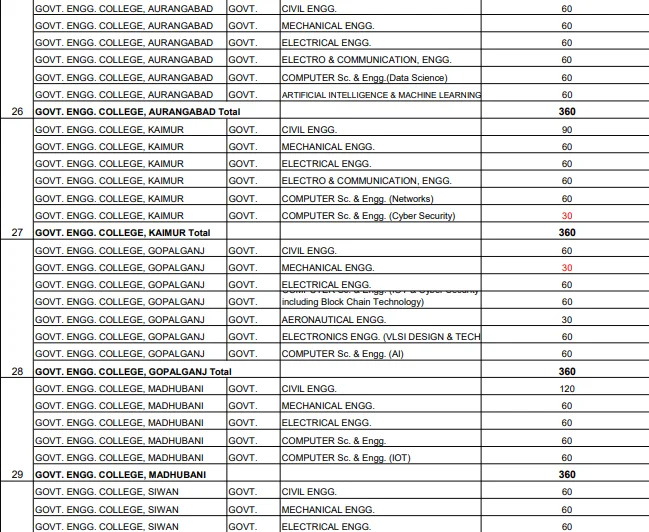
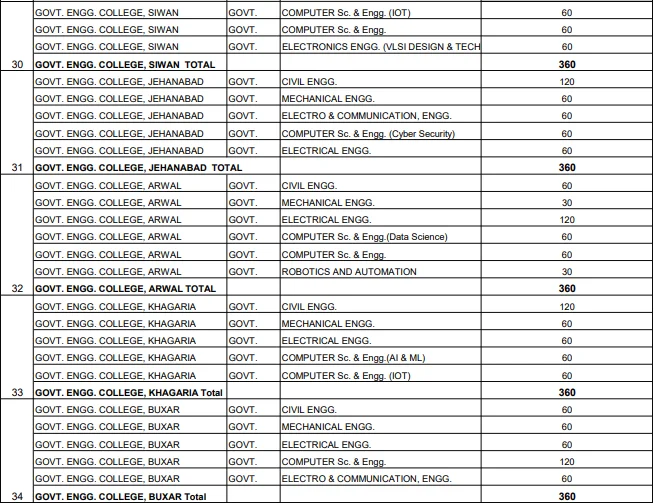
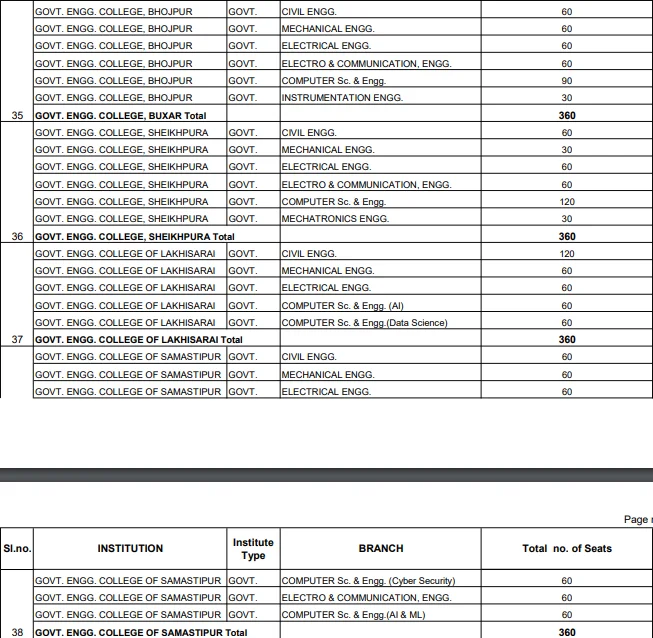
How To Track Your Progress By Using The BCECE PYQ PDF Download?
When you are preparing for the Bihar Combined Entrance Competitive Examination, it is quite necessary that you keep monitoring your performance with the practice of BCECE previous year question PDF download. Because only this way, you will be able to maximize your success in the exam. So, for this reason, we have mentioned some points with which you can track your progress in detail below.
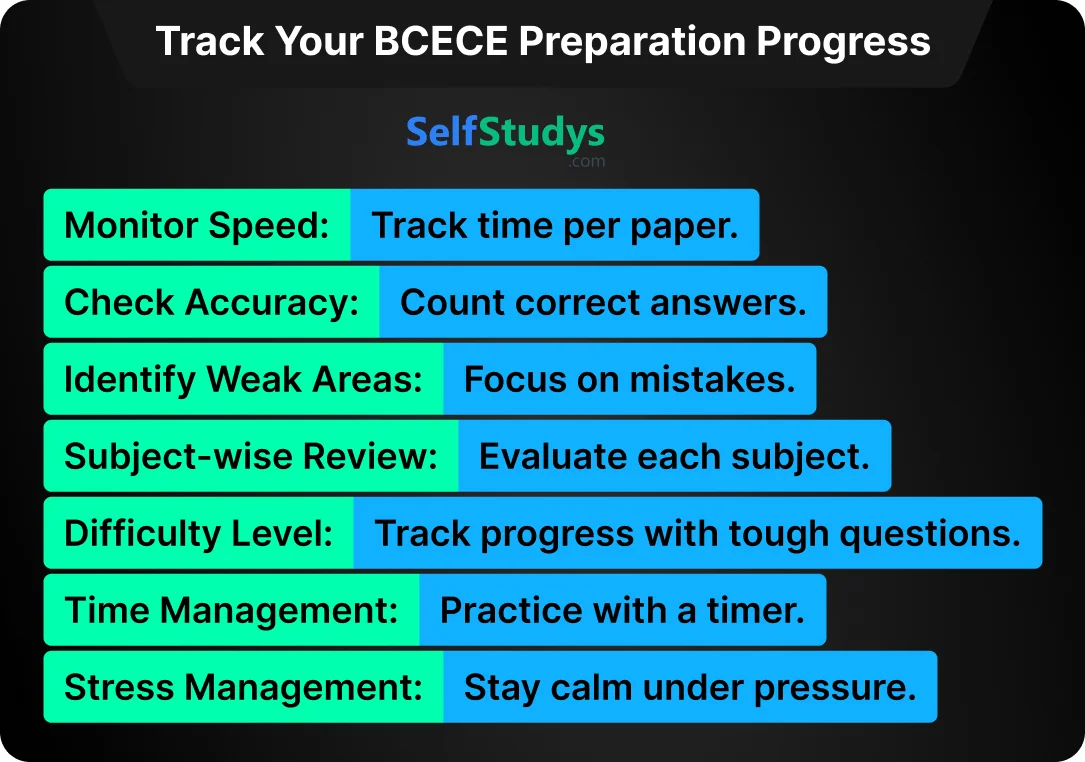
- Practice of the BCECE previous year papers helps you in checking your speed as well as accuracy in answering the questions. So, as you solve them, you should note how long you take to complete the paper. Then, you should compare it with the total time that is allocated for the actual exam. By doing so, you can notice if your speed is improving or if you need to work on time management. Moreover, you must keep an eye on the number of correct answers you have given to know about the accuracy.
- With the practice of the BCECE PYQ PDF download, you can pinpoint the areas where you are struggling. Poor performance on certain topics or question types consistently explains to you that you need to focus more on those areas. By reviewing your incorrect responses, you can notice the concepts in which you require deep understanding. When you track this progress, you make sure that you focus your study efforts on the weaker areas and turn them into strengths.
- As there are different subjects included in this exam, solving the previous year question paper of BCECE and tracking your performance helps you to understand how well you are doing in every subject. For example, if you are performing better in Chemistry as compared to Physics, then you can adjust your preparation strategy accordingly. Through this subject-wise approach, you will be able to maintain a balanced preparation plan.
- The difficulty level of the BCECE previous year questions may vary over time. That’s why, by engaging with various question papers, you can track whether you are handling challenging questions in an effective way or not. If the questions that once seemed difficult to you are now easier to solve, then, it shows that you are making good progress. Different years of paper solving will help you know if you are prepared to tackle tough questions or if you need to practice more.
If you solve the BCECE previous year question paper with a timer, then you can mirror the situations of a real exam. In this way, you can track your progress in terms of readiness for the exam. You should pay attention to how you handle stress as well as manage your time during these sessions. You can also track if your ability to stay calm and solve questions within the given time improves as you solve the papers.







 Profile
Profile Signout
Signout










 Quiz
Quiz
 Get latest Exam Updates
Get latest Exam Updates 










